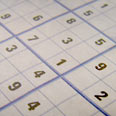
Sudoku craze got its worlwide start in the U.K.
צילום: גבי מנשה
Sudoku craze hit Britain last month
Developer believes craze will stay, even if mania for it will slow down
LONDON - In the lull after last month’s election, U.K. newspapers focused on a contest that arguably captures the public imagination in a way the politicians never managed - a number puzzle called Sudoku.
A pen-on-paper game, Sudoku - or Su Doku - involves filling in a square divided 9 by 9 into 81 boxes so that each row, column and 3 by 3 box contains the digits 1 to 9.
It requires no math, just reasoning and logic, and since The Times first launched its version in November last year, almost every other paper in Britain has followed suit.
"The rules are simple compared with most puzzles, but behind that lies a whole wealth of complexity. That layer of difficulty is very addictive," said Michael Harvey, Features Editor at The Times.
Despite its Japanese-sounding name, Sudoku has its origins in 18th century Switzerland and made a stop in 20th century New York before it hit Japan two decades ago. It finally arrived in Britain with the help of retired New Zealand judge Wayne Gould.
"I had always been interested in British-style cryptic crosswords and code-breaking and computer programming," he told Reuters.
"I was in a Japanese bookshop, and this crossword-like grid was the only thing I recognised."
The grid that had caught Gould’s eye was "su doku", which translates roughly as ’unique number’.
Best-selling book
Taken with the game, Gould developed a computer program that makes up Sudoku puzzles on the spot.
"I had been planning to use my retirement to brush up my programming skills, so I used Sudoku as a programming exercise," he said. "I realized its potential very early on, however."
Gould took his idea to The Times. It was so popular with readers that one called it a "craze" just two weeks after it launched.
"There w as a big reader reaction," said Harvey. "Within days, we knew we had a big puzzle on our hands."
Thousands of people now enter The Times’ daily competition and its first book of the puzzles shot to the top of non-fiction bestseller lists.
Other newspapers quickly followed suit.
Britain’s best-selling daily The Sun launched "Sun Doku" and The Independent started a hunt to find Britain’s Sudoku Grand Master.
Harvey expects the enthusiasm for Sudoku - dubbed the new Rubik’s Cube - to ease but insists the puzzle is not a flash in the pan.
"It’s here to stay. I just think the level of Sudoku mania will die down," he said.
The craze has started to catch on elsewhere.
In South Africa, where the Business Report newspaper introduced Sudoku earlier this month, players showed withdrawal symptoms when it did not appear one Monday.
"Despair! Distress! Today’s edition seems not to have the 9x9 digit numbers puzzle you introduced last week," Paul Robson wrote to the paper via e-mail.
"As another harmless pastime to be solved while unwinding over a beer on the way home it went so well with the crosswords ... to keep one amused through the second beer, and had some scope to even stretch to entertainment for a third glass of icy cold, golden brew. Please don’t drop it! Please bring it back!"










